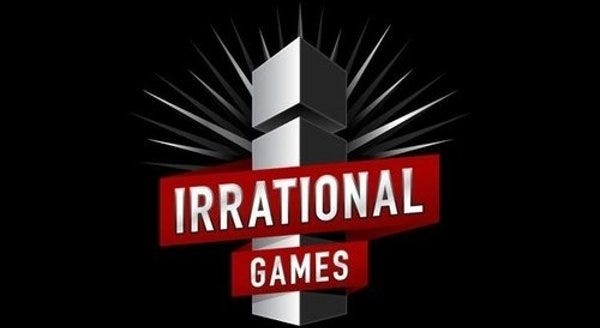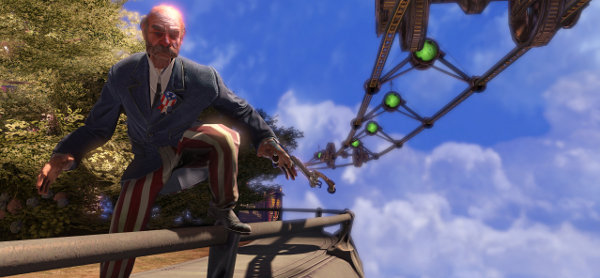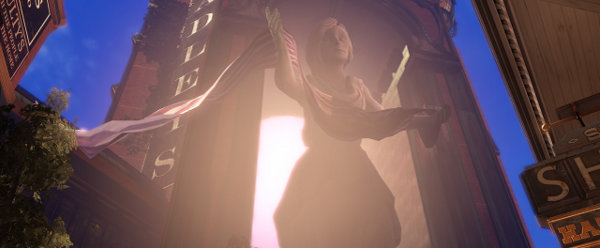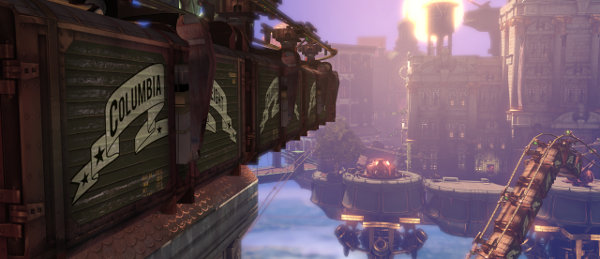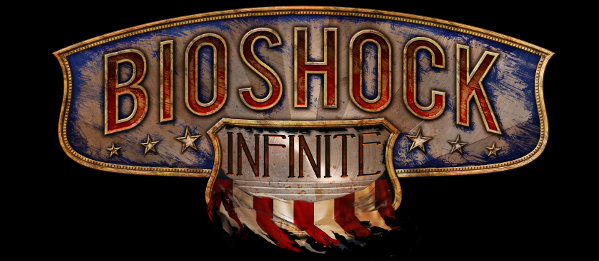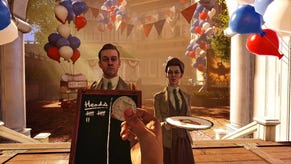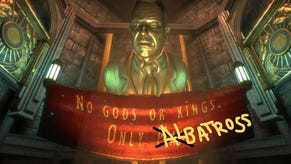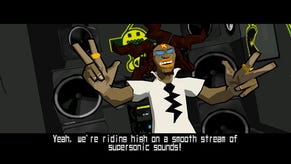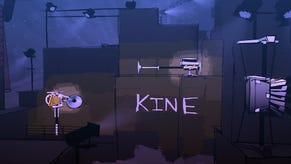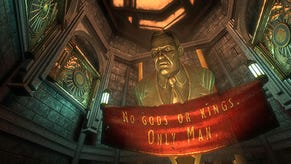Irrational Anthem: Their New Game, Unveiled
It's rare as a games journalist that you find yourself sitting in a hall, knowing you're there for an announcement, without a single clue what the game actually is. You've always got theories. And – yeah – I had some, but none that I'd dignify with a word like “theory”. “Guesses” would be as far as I'd go. So when the trailer rolls, it's a surprise in all sorts of ways. And since there's a chance this is the first place you've heard about the game, we'll like to recreate the experience for you guys. So, head below for the video they unveiled the game with...
I'd imagine that your responses are complicated. I moved from a smile at the opening references mixed with a slight disappointment that it was going to be something so similar, before switching to excited bewilderment, thinking about how tired I am with steampunk before realising the visual style wasn't actually steampunk at all, which all rapidly escalated into a cheery WTF?-ness. I scribbled Rainbow Islands vs Bioshock in my notes, later adding Lynch, The Wicker Man, Skies of Arcadia, Pre-War WWI American Triumpialism/Utopianism and all other sorts of fun stuff. The only real disappointment comes with the name: BioShock: Infinite.
Talking to Ken Levine later reveals that there's a reason for the title, which will only become apparent with play, but it doesn't seem to initially fit. At first, I thought it was a little like an attempt to do a Final Fantasy. As in, recreate the franchise to mean, “every game in Bioshock can have a totally different world”... but at the moment it's deliberately foggy whether this is the same universe as Bioshock. I suspect yes, but buried. As such, it seems more like what Assassin's Creed does. Presently, Bioshock means Rapture and its certain spread of mechanics. By doing this, they're trying to make Bioshock an approach, with each game offering you some insanely baroque new world, perhaps with something connecting them all. So in the same way that the Assassin's Creed games can move from Crusades-era Middle East to Renaissance Italy, Bioshock can move from the depths of Rapture to the sky-challenging glory of...
Okay, what the game should be called is Columbia, in the same way that Bioshock should have been called Rapture.
Columbia is the city of the future circa 1900, created as a sort of moving World's Fair, travelling the world to show the sheer power and majesty of the rising newly technological America – the Moon Landing of its day. Levine argues that between 1880 and 1900 America transformed from this Agrarian backwater to a rising technological power that ended up claiming the 20th century as its own.
Inevitably, it goes wrong. The World's Fair was secretly weaponized, covered in cannons which go and do what cannons are made for. It goes rogue, causes a terrible international incident and disappears into the clouds never to be seen again.
Skip forward a few years, where in a Chandlerian move, ex-Pinkerton, strikebreaker and general low-life Booker DeWitt is hired to find a woman. This Elizabeth is missing. DeWitt can handle this. It's what he does. The only problem is that she's apparently in Columbia... and the mysterious figure hiring you says he can get you there.
Arriving, you discover that she's not exactly a pure victim. She's enormously powerful, and she's caught in the middle of the storm which is tearing apart Columbia. You have to escape, together, and combine your abilities to do so.
Obvious changes first. You aren't the blank cipher. This time around, you're playing a character with a distinct personality. Secondly, you aren't alone. This isn't the lonely isolation of System Shock 2. This is a game where much of the time you have an equal partner in surviving this crazed world. In fact, it's not about lonely isolation full stop. The inhabitants of Columbia seem as wired and demented as the Splicers of Rapture, but it's a different sort of dementia.
The actual walk-through demo of the game – highly choreographed, as they always are at this stage – shows sections which make it clear. A lot is about trying to create the idea of horror and tension in broad-day light. For example, there's a section where you walk into a bar. Immediately, every eye in the packed place turns to you. The seconds stretch out. You get to move and interact a little – then an inhabitant pulls a gun, and it all kicks off. It escalates into an enormous mob, hunting you down and cornering you. And it really is a mob, with far more enemies converging on you than I saw in Bioshock. Electricity blast after electricity blast fells them, but it's clearly not going to be enough as they move with measured pace towards you.
At which point the demo actually introduces Elizabeth, who summons a storm cloud above the gathered hordes' head. Water lashes down... and since they're wet, the whole crowd are electrocuted. The demo continues, with her making an enormous projectile out of all the bits of cutlery in a passing cart and ending with you taking a whole bloody bridge out between combining your powers. All the while, the characters talk to one another and do some lovely, relatively subtle storytelling. The take-away moment is when you realise that Elizabeth's nose is bleeding after a particularly telekinetic display. These exertions aren't easy for her.
The second thing to catch the eye is – to use the true technical phrase – full on proper mentalisms which make Columbia unlike any game environment I've ever traversed. My favourite is an early moment where a robotic horse drags a carriage with no wheels along the floor, which is a fantastic sight gag on the horseless carriage. A woman, on the porch of a burning house, silently and solemnly sweeping up. The man covered in ravens. The odd collision-style of the whole world, as if it was made by the most over-literal architect in the world. Make a flying city you say? Well, take a normal building and stick a load of balloons on the side, yeah? The floating islands are connected by grandiose sweeping tracks you attach yourself to and fly along, in either direction – which, with the grand blue skies above you, did make me think of Sonic of all things.
And then the heavyweight creatures which are pursuing Elizabeth. You see a little of one in the trailer – the heart floating in the water chamber, a bearded head attached with wires. The one which ends the playthrough is far larger, a creature which looks like some kind of sadomasochistic take on a giant raven and a gargoyle. And the key element is the array of colour. When, near the conclusion before the arrival of the last creature, the winds pick up and the sky darkens, it's actually a little disturbing and shows what you gain by using the full array of the palette. It's not a game about sitting in a closet, covered in grime any more.
But it is a game about a lot of stuff. It's a game people are going to end up spewing a grand torrent of exciting wank about. It's got ideas.
The 1880-1900 gap is key. “This isn't a game about history – but it is a game set in the context of history,” as Levine puts it. In 1880, the US was a country tired and broken by war, having experienced massive casualties. In 1900... it was having different sorts of urges. Levine talks about President McKinley questioning whether they should annex the Philippines, just freed from Spain. At which point Levine reads a full quote from McKinley on the issue, as he tossed and turned whether he should do this potentially horrible thing...
I walked the floor of the White House night after night until midnight; and I am not ashamed to tell you, gentlemen, that I went down on my knees and prayed to Almighty God for light and guidance more than one night. And one night late it came to me this way - I don't know how it was, but it came: (1) That we could not give them back to Spain - that would be cowardly and dishonorable; (2) that we could not turn them over to France or Germany - our commercial rivals in the Orient - that would be bad business and discreditable; (3) that we could not leave them to themselves - they were unfit for self-government - and they would soon have anarchy and misrule over there worse than Spain's was; and (4) that there was nothing left for us to do but to take them all, and to educate the Filipinos, and uplift and civilize and Christianize them, and by God's grace do the very best we could by them, as our fellow men for whom Christ also died. And then I went to bed and went to sleep and slept soundly.
That's what Bioshock: Infinite is about.
When the demo finishes and Levine leaves the stage, and an enormous image appears on the background. A presidential figure with the bell of liberty in one hand, surrounded by crude stereotypes of immigrants of all stripes. The legend beneath it screams: “It is our holy duty to guard against the foreign hordes”. Repurposed period propaganda posters set the tone. “Her eyes.. so blue! Her skin... so white!” asks one poster “... or are they?” before warning about hidden genetic purity. They permeate the game – "FOR FAITH! FOR RACE! FOR FATHERLAND!" caught my eye along with warnings about the ever-elusive "they" taking your gun, wife and just about everything else.
The fascinating thing about Columbia is that while it's a failing utopia of some sort, it's far more functional than Rapture. It's a game set in the period before World War I has reshaped and coloured this kind of thinking. It's a game that feels set on the brink of disaster – there is some WWI propaganda starting to creep in, and quiet talk about “The Siege of Columbia”, but the whole mood of the game seems triumphal – the pre-WWI utopianism I was talking about earlier. Not to put too fine a point on it, it's a city in the skies. It's worth remembering that the game has been teased as “Icarus”. Icarus would have been a little too on the nose, I suspect, but there's no doubt that Columbia is going to come crashing down.
Let's cut to the chase: at this point, it appears the game's major themes are American Imperialism and fear of immigration. By its simple existence, it's drawing lines between what happened at the start of the last century and the start of this one. It is, at least potentially, about as political as it gets.
With the game tentatively scheduled for a 2012 release, I can't wait to see more.
And come back tomorrow for us talking to Ken Levine. The only Bioshock: Infinite interview, I strongly suspect, to mention anarchist Emma Goldman.
